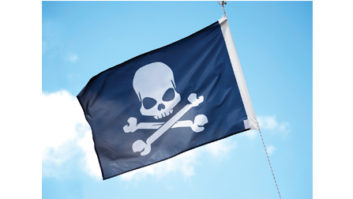WASHINGTON — While the FCC Enforcement Bureau tally of fines against “pirate” operators has grown steadily this year, it is hard to know how many of those fines will ever be collected.
In fact, broadcast industry people familiar with commission practices believe the FCC likely fails to collect a majority of pirate fines.
Once the commission starts to go after an alleged illegal operator, things get complicated. It’s not easy to collect money from what often turn out to be fly-by-night operations. And in tight economic times, when federal agencies face budget constraints, authorities must decide how far to go to collect a relative pittance.
One problem lies in the fact that the FCC needs an outside agency help to get an enforcement action to stick, observers said. The commission can assess fines on an unlicensed broadcaster, but it must engage the services of the United States Department of Justice to file a civil claim for the judgment rendered, according to the Communications Act of 1934.
Risk/reward

San Francisco Liberation Radio is now an Internet stream. It ceased operation in October 2003 after a raid by the FCC and San Francisco Police Department.
An FCC official, speaking on condition of anonymity, said data to determine how much has been collected are not readily available.
“Fines are a tool, not a goal of the commission. We are not a collection agency and we don’t track specific figures. Our goal is to limit interference and enforce licensing.”
The commission declined to disclose collection figures for this story but said that in FY 2011, which ended in September, it issued 17 notices of apparent liability proposing $257,000 in forfeitures against operators of unlicensed stations or people exercising a substantial amount of control over such stations.
According to its statistics, FCC agents shut down 97 unlicensed broadcast operations over that period. The Enforcement Bureau issued 154 warnings and 93 notices of unlicensed operation.
According to the Enforcement Bureau’s page on the FCC website, base forfeiture amounts for illegal broadcast operators are $10,000 for operation without an instrument of authorization of service, $7,000 for alleged interference and $4,000 for each unauthorized emission using an unauthorized frequency. Fines for pirates may be cumulative if a given case is considered egregious.
Cases of pirate broadcasters who don’t pay the monetary forfeitures eventually are turned over to the U.S. Department of Justice. DOJ, in turn, determines whether pursuing the pirates through civil litigation is worth the effort, presumably based on a combination of time, money and manpower.
The Justice Department did not respond to Radio World questions regarding its criteria for prosecuting pirates and how many cases the FCC had referred to it.
The FCC doesn’t keep the money collected as a result of fines, according to an agency official. Those amounts, like anything paid to the commission, are deposited into the U.S. Treasury.
“In some cases the fines are paid, but many times a lesser fine is negotiated in terms of a settlement,” according to the commission official. “Sometimes the DOJ decides not to go after [pirate broadcasters] for the money because of an obvious inability to pay. They’ll weigh the cost of the litigation and getting anything from them.”
Inability to pay
Fletcher, Heald & Hildreth attorney Howard Weiss assessed the situation this way: “You have a government agency that is faced with a lot of other high priorities … drugs, crimes of violence and who knows what else.” Going after “deadbeat” pirate broadcasters likely isn’t a high priority for the Justice Department, he said.
Weiss also believes the FCC has trouble collecting fines because of the disparate messages sent to offenders.
“You have one jurisdiction [the FCC] saying you are liable, and then the DOJ coming after you to collect the fines. It is an inherent weakness in how to do things.”
The reasons fines go unpaid are numerous.
“Quite honestly, some of these pirate station operators are fly-by-night operations,” said an FCC official, who, like others in this article, spoke on the condition of anonymity.
“They move around and disappear. We often get default judgments when [pirates] fail to appear in court. Then many times they don’t have any assets under which we can collect.”
When the FCC issues a notice of apparent liability against a pirate station operator, the alleged offender has 30 days to pay the fine or argue his or her case. In an ensuing forfeiture order, the FCC affirms the fine or responds to arguments made in response to the NAL.
The commission can reduce the amount of monetary penalties against radio pirates.
In July 2011, for example, it reduced a forfeiture order against Christopher Myers from $10,000 to $5,000 following a petition for reconsideration in which he said he couldn’t afford the fine. He had been accused of operating an unlicensed radio transmitter on 95.9 MHz in Lauderhill, Fla., in 2010.
In another instance, the FCC recently reduced a monetary forfeiture against Fritzner Lindor of Orange Park, Fla., for unlicensed operation of a radio station; the fine was cut from $15,000 to $300 because Lindor documented an inability to pay.
Not a new problem
The collection question was discussed more than a decade ago in a 2000 report from the Office of Inspector General, which audited the FCC’s Civil Monetary Penalty Program. That assessment looked at all monetary forfeitures and found success in less than a quarter of them.
The report found a lack of coherent policy among the agency’s bureaus on matters involving forfeitures, as well as institutional resistance from the Department of Justice to pursue such cases.
According to the report, “the commission has not established an effective program for managing civil monetary penalty actions.”
While the research data are over a decade old, many agency observers say a disconnect remains between issuing fines and collecting the money. It’s not clear whether the Office of Inspector General has revisited the issue since.

Wired magazine’s website includes a wiki on ‘How to Set Up a Pirate Radio Station.’ (While the article states that the authors ‘wouldn’t condone illegal conduct of this type,’ it also offers tips to avoiding detection and location.)
“I think the general perception among radio broadcasters is that the FCC, at best, does a sporadic job at chasing after pirate radio broadcasters” to collect fines, said Womble Carlyle attorney John Garziglia. “You have long-term pirates broadcasting with impunity without fear of paying much.”
Another communications attorney familiar with FCC procedures suspects that “lots of fines never get paid, largely because there is no downside to non-payment.”
Stephen Provizer, a former pirate who now blogs about music at bit.ly/cdFfdn, believes most pirate radio station operators have little to fear when it comes to paying fines.
“I believe [the FCC) hardly ever collects anything. It’s a fairly empty threat to pirates,” said Provizer, who founded former pirate station Radio Free Allston.
“For one thing many pirates are from countries where punishments for radio piracy are much more serious. Secondly, the FCC has shown little effort to mobilize the legal machinery necessary to collect fines.”
‘Paper tiger’?
John Anderson at DIYMedia.net, a blogger who follows microradio and radio piracy, believes it’s clear that some radio pirates are aware that few fines are actually collected. “The FCC is a paper tiger when it comes to enforcement. Those who engage in pirate radio as an act of electronic civil disobedience are likely to school themselves on the nuts and bolts of FCC policy in this area.
“The more you know about the somewhat byzantine administrative procedure that is FCC enforcement, the easier it is to assess the relative risk of going on the air,” he said. “For many, the informed relative risk is actually quite small. When a fine gets knocked down from $10,000 to $500 or even $250, it really isn’t a painful punishment to take.”
Making it yet more difficult to collect outstanding fines is a federal law that requires lawsuits seeking to enforce a civil fine or forfeiture to be initiated within five years of the infraction taking place, said Harry Cole, attorney at Fletcher Heald and a Radio World columnist.
“The statute of limitations in essence could shield the pirate from the financial penalties even if it is determined they violated FCC rules,” Cole said.
And while the commission can levy fines, its Enforcement Bureau can’t arrest a pirate broadcaster or send them to jail.
The FCC “has no authority to make arrests, obviously. We do have the right to inspect broadcast equipment without a search warrant, but we cannot confiscate broadcast equipment,” said an agency official, adding that the Justice Department has the power to seize equipment with assistance from the U.S. Marshals Service.
In a high-profile raid this year in Boston, the Justice Department seized radio equipment used by a pirate broadcaster. Datz Hits Radio 99.7FM had been warned by the FCC to stop transmitting after interference complaints were received from a licensed broadcaster and from the Federal Aviation Administration. The latter complained of interference with radio communications at Boston’s Logan Airport.
While the FCC steers spectrum enforcement on a national scope, there are now three states that have criminalized unlicensed broadcasting: New York, Florida and New Jersey. In New York, which passed anti-pirate legislation this summer and begins enforcement in January 2012, unlicensed broadcasting is a Class A misdemeanor punishable by fines and up to a year in jail.
Observers said it’s unclear how any jurisdictional issues between the commission and the three states would be settled. An FCC official said there have been no such conflicts so far. “We have, in fact, coordinated efforts during several [pirate] proceedings.”
David Donovan, president of the New York Broadcasters Association, said he’s confident the state’s new anti-piracy laws will be a deterrent to those considering illegal broadcasting.
DIYMedia’s Anderson blogged this summer that in Florida, which criminalized unlicensed broadcasting in 2004, some pirates have been arrested but no one has ever been convicted under the state law. “New Jersey’s anti-pirate statute,” he wrote, “has snagged a whopping zero broadcasters in five years.”







